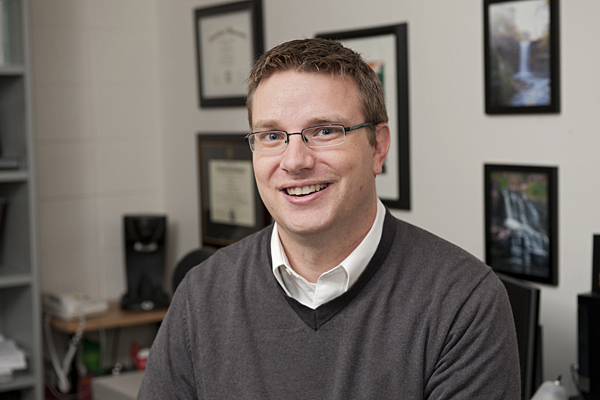
Flexible workplaces
Study suggests flexible workplaces promote better health behavior and well-being
9:15 a.m., Dec. 6, 2011--A flexible workplace initiative improved employees’ health behavior and well-being, including a rise in the amount and quality of sleep and better health management, according to a new study by researchers at the University of Minnesota and the University of Delaware. It is published in the December issue of the American Sociological Association’s Journal of Health and Social Behavior.
Eric Tranby, assistant professor of sociology at UD, is a co-author of the study, which was led by University of Minnesota sociology professors Erin Kelly and Phyllis Moen and also included graduate student Qinlei Huang.
Research Stories
Chronic wounds
Prof. Heck's legacy
“Our study shows that moving from viewing time at the office as a sign of productivity, to emphasizing actual results can create a work environment that fosters healthy behavior and well-being,” said Moen in a news release issued by the American Sociological Association and the University of Minnesota. “This has important policy implications, suggesting that initiatives creating broad access to time flexibility encourage employees to take better care of themselves.”
Using longitudinal data collected from 608 employees of a white-collar organization before and after a flexible workplace initiative was implemented, the study examined changes in health-promoting behaviors and health outcomes among the employees participating in the initiative compared to those who did not participate.
Introduced at the Best Buy headquarters in Richfield, Minn., in 2005, the workplace initiative—dubbed the Results Only Work Environment (ROWE)—redirected the focus of employees and managers toward measurable results and away from when and where work is completed. Under ROWE, employees were allowed to routinely change when and where they worked based on their individual needs and job responsibilities without seeking permission from a manager or even notifying one.
Among the study’s key findings:
- Employees participating in the flexible workplace initiative reported getting almost an extra hour (52 minutes) of sleep on nights before work.
- Employees participating in the flexible workplace initiative managed their health differently: They were less likely to feel obligated to work when sick and more likely to go to a doctor when necessary, even when busy.
- The flexible workplace initiative increased employees’ sense of schedule control and reduced their work-family conflict which, in turn, improved their sleep quality, energy levels, self-reported health and sense of personal mastery while decreasing employees’ emotional exhaustion and psychological distress.
According to the researchers, narrower flexibility policies allow some “accommodations” for family needs, but are less likely to promote employee health and well-being or to be available to all employees.
Tranby, who joined the UD faculty last fall, contributed to the study’s data analysis. The study is part of Tranby’s larger research agenda to assess the effects of flexible work policies on well-being. In addition to investigating the effect of a workplace intervention on workers’ work-family conflict, health and work patterns, he also is examining how state-mandated flexible work policies impact the financial well-being of women and families and is comparing the results internationally.
Photo by Evan Krape








